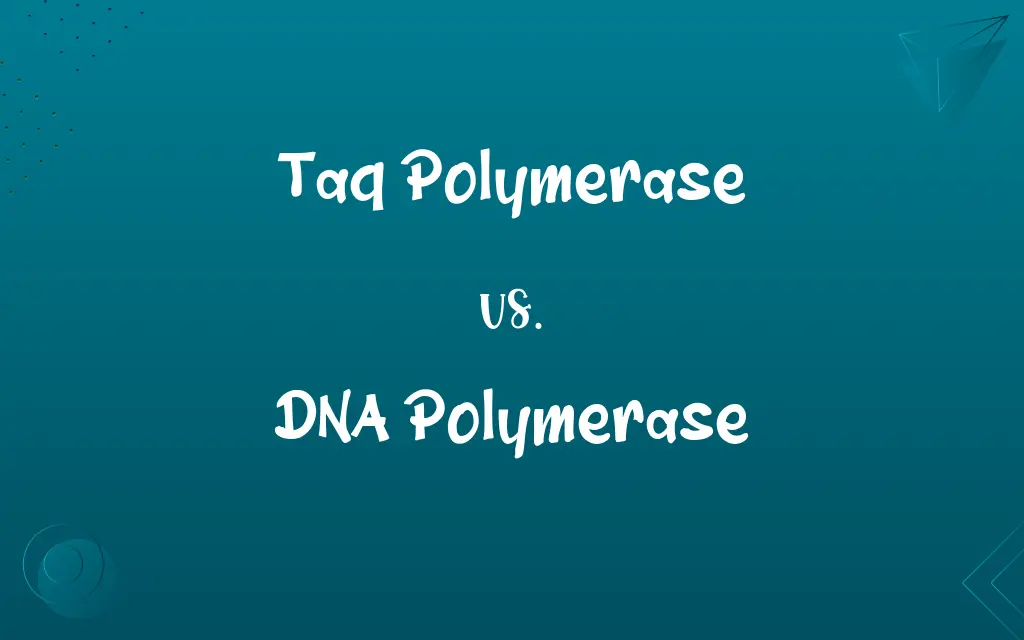Taq Polymerase vs. DNA Polymerase: Know the Difference

By Shumaila Saeed || Published on January 20, 2024
Taq Polymerase is a heat-stable enzyme used in PCR, derived from Thermus aquaticus, whereas DNA Polymerase is a broader class of enzymes involved in DNA replication and repair.

Key Differences
Taq Polymerase, isolated from the bacterium Thermus aquaticus, is specifically designed to withstand high temperatures used in PCR (Polymerase Chain Reaction). In contrast, DNA Polymerase refers to a group of enzymes, found in all organisms, that are essential for DNA replication and repair, operating at normal biological temperatures.
Shumaila Saeed
Jan 20, 2024
The unique feature of Taq Polymerase is its thermal stability, enabling it to remain active even at temperatures around 95°C, which is critical for denaturing DNA strands during PCR. DNA Polymerase, on the other hand, generally denatures at these temperatures and is suited for cellular processes occurring at much lower temperatures.
Shumaila Saeed
Jan 20, 2024
Taq Polymerase’s functionality is mostly limited to amplifying DNA sequences in PCR, where it synthesizes new DNA strands from single-stranded templates. DNA Polymerase, in its natural setting, participates in a wider range of activities, including synthesizing new DNA strands during cell division and repairing damaged DNA.
Shumaila Saeed
Jan 20, 2024
One of the limitations of Taq Polymerase is its lack of proofreading ability, leading to a higher error rate during DNA synthesis. Various DNA Polymerases, especially those involved in cellular replication, often have proofreading abilities to correct errors, ensuring genetic fidelity.
Shumaila Saeed
Jan 20, 2024
Commercially, Taq Polymerase is widely used in molecular biology laboratories for PCR-based applications. DNA Polymerase finds broader application in research, not only in replication studies but also in understanding genetic diseases and DNA repair mechanisms.
Shumaila Saeed
Jan 20, 2024
ADVERTISEMENT
Comparison Chart
Error Rate
Higher due to lack of proofreading
Lower in many types, due to proofreading capabilities
Shumaila Saeed
Jan 20, 2024
ADVERTISEMENT
Taq Polymerase and DNA Polymerase Definitions
Taq Polymerase
Taq Polymerase is a key component in the polymerase chain reaction (PCR) process.
Without Taq Polymerase, the PCR process would not efficiently replicate DNA segments.
Shumaila Saeed
Jan 04, 2024
DNA Polymerase
Many DNA Polymerases have proofreading abilities for error correction.
The proofreading function of DNA Polymerase reduces mutations during DNA replication.
Shumaila Saeed
Jan 04, 2024
Taq Polymerase
Derived from Thermus aquaticus, Taq Polymerase is crucial for DNA amplification in the lab.
Researchers rely on Taq Polymerase for efficient and quick DNA amplification.
Shumaila Saeed
Jan 04, 2024
DNA Polymerase
DNA Polymerase is an enzyme that synthesizes DNA molecules.
DNA Polymerase ensures accurate DNA replication during cell division.
Shumaila Saeed
Jan 04, 2024
Taq Polymerase
Taq Polymerase enables the synthesis of DNA strands from a template at high temperatures.
The stability of Taq Polymerase at high temperatures makes it ideal for laboratory DNA experiments.
Shumaila Saeed
Jan 04, 2024
ADVERTISEMENT
DNA Polymerase
It plays a crucial role in DNA replication and repair in living organisms.
DNA Polymerase repairs damaged DNA strands, maintaining genetic integrity.
Shumaila Saeed
Jan 04, 2024
Taq Polymerase
This enzyme lacks proofreading ability, a characteristic of Taq Polymerase.
The error rate in PCR can be attributed to the lack of proofreading in Taq Polymerase.
Shumaila Saeed
Jan 04, 2024
DNA Polymerase
DNA Polymerase reads the existing DNA strands to create two new strands.
During cell replication, DNA Polymerase duplicates the genetic material.
Shumaila Saeed
Jan 04, 2024
Taq Polymerase
Taq Polymerase is a heat-resistant enzyme used in PCR.
Taq Polymerase remains active during the high-temperature cycles of PCR.
Shumaila Saeed
Jan 04, 2024
DNA Polymerase
This enzyme comes in various types, each with specific functions in DNA synthesis.
Different types of DNA Polymerase are used for replication and repair processes.
Shumaila Saeed
Jan 04, 2024
Repeatedly Asked Queries
How does Taq Polymerase function in PCR?
Taq Polymerase synthesizes new DNA strands from a template during the high-temperature cycles of PCR.
Shumaila Saeed
Jan 20, 2024
What is Taq Polymerase?
Taq Polymerase is an enzyme used in PCR, derived from Thermus aquaticus, known for its heat stability.
Shumaila Saeed
Jan 20, 2024
Where is Taq Polymerase commonly used?
Taq Polymerase is widely used in molecular biology laboratories, primarily for PCR applications.
Shumaila Saeed
Jan 20, 2024
Can Taq Polymerase function at room temperature?
Taq Polymerase can function at room temperature, but it is optimized for high temperatures typical of PCR.
Shumaila Saeed
Jan 20, 2024
What makes Taq Polymerase unique in PCR?
Taq Polymerase's ability to withstand the high temperatures of PCR, allowing DNA denaturation and synthesis, makes it unique.
Shumaila Saeed
Jan 20, 2024
Does Taq Polymerase have proofreading ability?
No, Taq Polymerase lacks a proofreading function, leading to a higher error rate in PCR.
Shumaila Saeed
Jan 20, 2024
Are there different forms of DNA Polymerase?
Yes, there are several forms of DNA Polymerase, each with specific roles in DNA synthesis and repair.
Shumaila Saeed
Jan 20, 2024
What is DNA Polymerase?
DNA Polymerase is a class of enzymes involved in DNA replication and repair in living organisms.
Shumaila Saeed
Jan 20, 2024
Why is Taq Polymerase heat-stable?
Taq Polymerase is heat-stable due to its origin from Thermus aquaticus, a bacterium that thrives in hot environments.
Shumaila Saeed
Jan 20, 2024
What is the role of DNA Polymerase in living cells?
DNA Polymerase plays a vital role in DNA replication and repair, ensuring genetic stability in cells.
Shumaila Saeed
Jan 20, 2024
How does DNA Polymerase contribute to genetic fidelity?
DNA Polymerase's proofreading function contributes to genetic fidelity by correcting errors during DNA replication.
Shumaila Saeed
Jan 20, 2024
What are the types of DNA Polymerase?
DNA Polymerase comes in various types, each specialized for different functions in DNA replication and repair.
Shumaila Saeed
Jan 20, 2024
Is Taq Polymerase naturally occurring?
Yes, Taq Polymerase is naturally occurring, originally isolated from the bacterium Thermus aquaticus.
Shumaila Saeed
Jan 20, 2024
What is the impact of DNA Polymerase malfunction?
Malfunction of DNA Polymerase can lead to genetic mutations and disorders due to errors in DNA replication and repair.
Shumaila Saeed
Jan 20, 2024
Can DNA Polymerase be used in PCR?
Regular DNA Polymerase is not suitable for PCR due to its heat sensitivity; Taq Polymerase is preferred.
Shumaila Saeed
Jan 20, 2024
Do all DNA Polymerases have proofreading abilities?
Many, but not all, DNA Polymerases have proofreading capabilities, crucial for error correction in DNA replication.
Shumaila Saeed
Jan 20, 2024
Do all organisms have DNA Polymerase?
Yes, all organisms have DNA Polymerase, as it is essential for DNA replication and repair.
Shumaila Saeed
Jan 20, 2024
What are the limitations of Taq Polymerase in PCR?
The main limitation of Taq Polymerase is its higher error rate due to the lack of proofreading ability.
Shumaila Saeed
Jan 20, 2024
How is DNA Polymerase essential for life?
DNA Polymerase is essential for life as it ensures accurate replication of the genetic material during cell division.
Shumaila Saeed
Jan 20, 2024
Can Taq Polymerase be used outside of PCR?
While mainly used in PCR, Taq Polymerase can be used in other DNA amplification techniques requiring high-temperature synthesis.
Shumaila Saeed
Jan 20, 2024
Share this page
Link for your blog / website
HTML
Link to share via messenger
About Author
Written by
Shumaila SaeedShumaila Saeed, an expert content creator with 6 years of experience, specializes in distilling complex topics into easily digestible comparisons, shining a light on the nuances that both inform and educate readers with clarity and accuracy.








































































